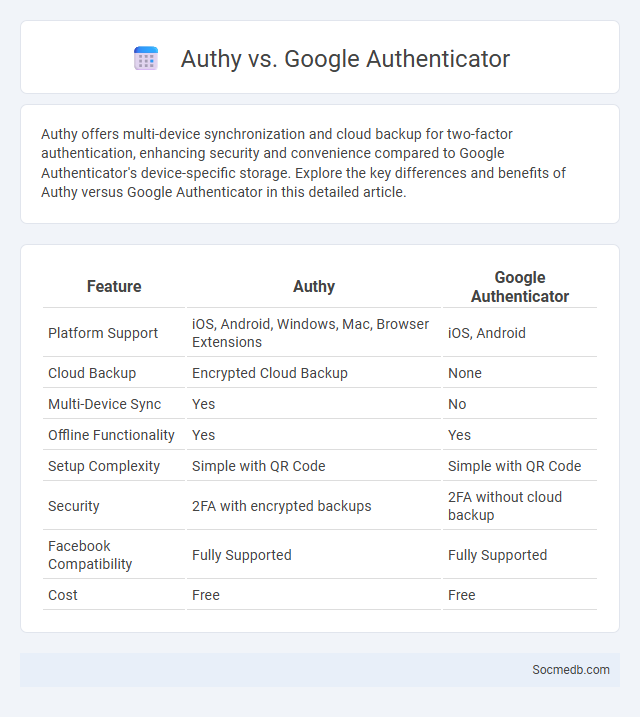
Photo illustration: Authy vs Google Authenticator
Authy offers multi-device synchronization and cloud backup for two-factor authentication, enhancing security and convenience compared to Google Authenticator's device-specific storage. Explore the key differences and benefits of Authy versus Google Authenticator in this detailed article.
Table of Comparison
| Feature | Authy | Google Authenticator |
|---|---|---|
| Platform Support | iOS, Android, Windows, Mac, Browser Extensions | iOS, Android |
| Cloud Backup | Encrypted Cloud Backup | None |
| Multi-Device Sync | Yes | No |
| Offline Functionality | Yes | Yes |
| Setup Complexity | Simple with QR Code | Simple with QR Code |
| Security | 2FA with encrypted backups | 2FA without cloud backup |
| Facebook Compatibility | Fully Supported | Fully Supported |
| Cost | Free | Free |
Introduction to Two-Factor Authentication
Two-Factor Authentication (2FA) enhances the security of your social media accounts by requiring a second form of verification beyond just a password. This additional layer, often a code sent to your mobile device or generated by an authenticator app, helps prevent unauthorized access even if your password is compromised. Implementing 2FA significantly reduces the risk of hacking and protects your personal information on platforms like Facebook, Instagram, and Twitter.
What is Authy?
Authy is a secure two-factor authentication (2FA) app designed to protect your online accounts by generating time-based one-time passwords (TOTPs). It supports multiple platforms, including iOS, Android, and desktop, ensuring seamless access and enhanced security across devices. By using Authy, you significantly reduce the risk of unauthorized access to your social media profiles and sensitive data.
What is Google Authenticator?
Google Authenticator is a security app that provides two-factor authentication (2FA) for your social media accounts by generating time-based one-time passwords (TOTPs). It enhances account protection by requiring a unique code from the app, in addition to your regular password, making unauthorized access significantly harder. You can easily link multiple social media platforms like Facebook, Instagram, and Twitter to Google Authenticator for robust security against hacking attempts.
Key Features Comparison: Authy vs Google Authenticator
Authy offers multi-device synchronization and encrypted cloud backups, enhancing accessibility and security, while Google Authenticator stores data locally without backup options. Authy's offline functionality and support for multiple platforms provide greater versatility compared to Google Authenticator's straightforward app integration. Both apps generate time-based one-time passwords (TOTP) for two-factor authentication, but Authy's additional features make it a preferred choice for users seeking enhanced convenience and recovery options.
User Experience and Interface
Optimizing social media platforms for enhanced User Experience (UX) and Interface (UI) design ensures seamless navigation, faster load times, and intuitive interactions. Your engagement increases when personalized content, accessible layouts, and responsive features cater directly to user preferences. Emphasizing visual hierarchy and interactive elements promotes longer session durations and stronger user retention.
Security and Encryption Measures
Social media platforms implement advanced security protocols such as end-to-end encryption to safeguard user communications and protect sensitive data from unauthorized access. Robust two-factor authentication (2FA) systems enhance account security by requiring multiple verification steps, reducing the risk of hacks and identity theft. Continuous monitoring for suspicious activities and regular security audits ensure compliance with privacy regulations and strengthen overall platform resilience against cyber threats.
Backup and Multi-Device Support
Social media platforms increasingly offer robust backup solutions to ensure user data remains secure and retrievable, even after account changes or device loss. Multi-device support enables seamless access and synchronization across smartphones, tablets, and desktops, enhancing user experience and engagement. End-to-end encryption and cloud synchronization are key technologies underpinning reliable backup and multi-device functionalities in leading social media applications.
Ease of Recovery and Account Migration
Social media platforms prioritize ease of recovery by offering multi-factor authentication, password reset options, and account activity monitoring to secure Your access even after suspicious activity or forgotten credentials. Account migration tools enable seamless transfer of data, followers, and content across platforms, ensuring continuity and minimizing the risk of data loss. You benefit from these features by maintaining control and consistency of Your social media presence with minimal disruption.
Pros and Cons: Authy vs Google Authenticator
Authy offers multi-device synchronization and cloud backup, enhancing convenience for users who need access across devices, while Google Authenticator prioritizes simplicity and offline security without cloud storage. Your choice depends on whether you value ease of recovery and multi-device access offered by Authy or prefer the strictly local storage and minimalistic approach of Google Authenticator. Both provide essential two-factor authentication but differ in backup and accessibility features influencing user experience and security trade-offs.
Choosing the Right Two-Factor Authentication Solution
Selecting the right two-factor authentication (2FA) solution for your social media accounts enhances security by requiring a second verification step beyond just passwords. Popular 2FA methods include SMS codes, authenticator apps like Google Authenticator or Authy, and hardware tokens such as YubiKey, each offering varying degrees of protection against hacking. Evaluating factors like ease of use, device compatibility, and resistance to phishing attacks ensures that your social media profiles remain secure without compromising convenience.
 socmedb.com
socmedb.com